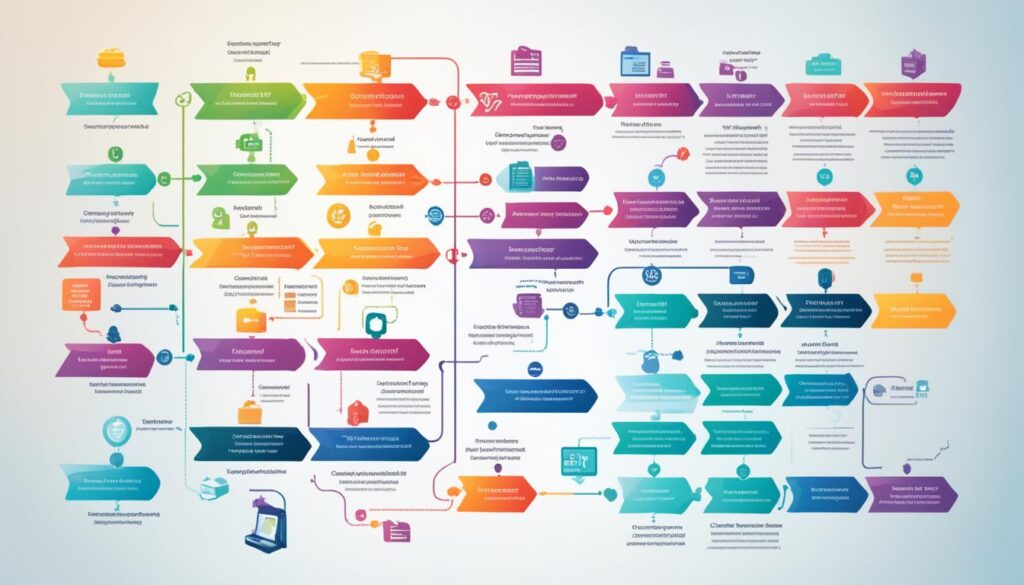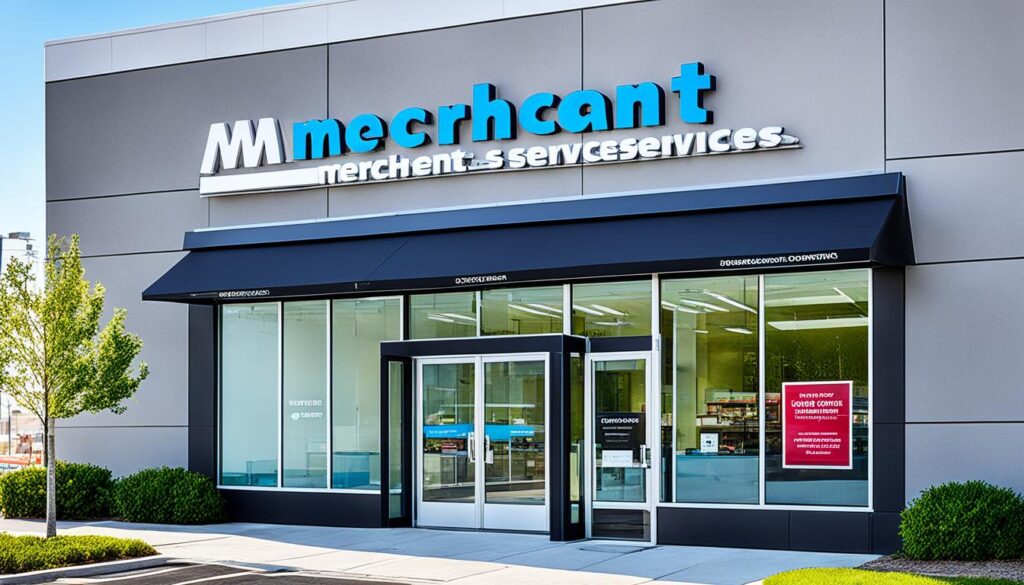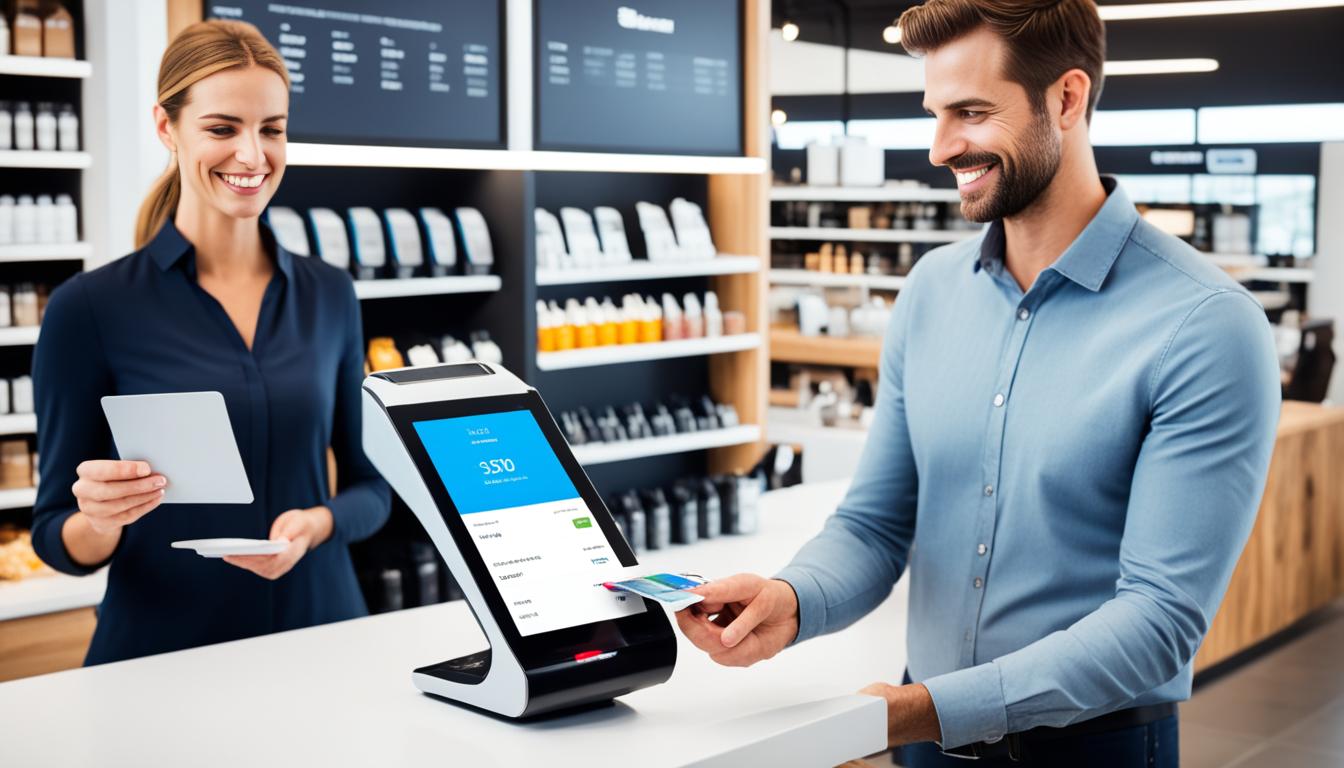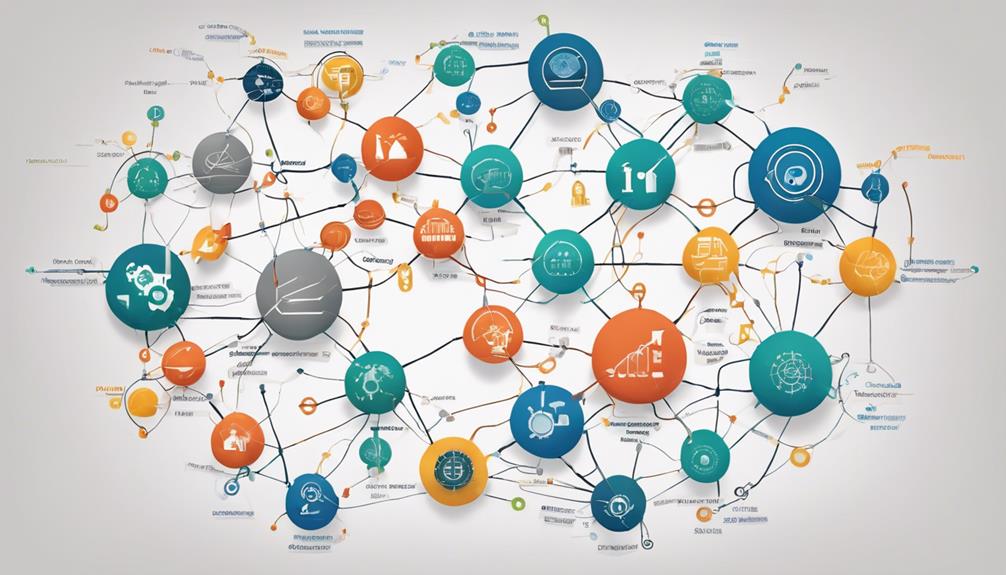In 2020, ecommerce transactions accounted for a notable 21.3% of global retail sales. With a growing number of shoppers choosing the convenience of online shopping, it is essential for businesses to adapt by offering reliable and adaptable payment options. This is where payment processing services become essential.
Merchant services encompass a wide range of solutions and technologies that enable businesses to accept and process various forms of payments, including credit card transactions, online payments, and electronic payments. From setting up payment gateways to utilizing secure payment solutions and implementing POS systems and virtual terminals, merchant services play a crucial role in facilitating seamless and reliable payment processing for businesses of all sizes.
Key Takeaways:
- Merchant services are essential for businesses to accept and process payments, including credit card transactions and online payments.
- Payment gateways, secure payment solutions, POS systems, and virtual terminals are all part of merchant services.
- Businesses need to ensure PCI compliance to protect customer information and maintain security.
- E-commerce merchants, retail merchants, wholesale merchants, affiliate merchants, and DTC merchants are different types of merchants based on their selling methods and target customers.
- A merchant account is a specialized bank account that allows businesses to accept and process credit card payments.
What Is a Merchant?
In the world of payment processing, a merchant refers to a business that accepts credit card payments from customers. Whether it’s in-person, online, or over the phone, merchants play a vital role in facilitating the exchange of goods and services. To enable smooth transactions, businesses need a specialized merchant account.
A merchant account is like a dedicated bank account that allows businesses to accept and process payments made by credit cards. It serves as a bridge between the merchant and the customer’s financial institution, ensuring that funds are securely transferred. Without a merchant account, businesses would struggle to accept card payments, severely limiting their ability to engage in online commerce.
Merchants can range from small online enterprises to retail stores and even multinational corporations. They sell a diverse range of goods and services, catering to a wide variety of consumers. Whether you’re purchasing clothing, electronics, or booking travel accommodations, chances are you’re interacting with a merchant and their merchant account.
“Merchants are the lifeblood of any economy. From local businesses to global retailers, they enable the exchange of goods and services, driving economic growth and customer convenience.”

| Type of Merchant | Description |
|---|---|
| E-commerce Merchant | Engages in online sales and operates an e-commerce platform. |
| Retail Merchant | Operates physical stores and sells merchandise to consumers. |
| Wholesale Merchant | Sells products in large quantities to retail merchants. |
| Affiliate Merchant | Utilizes affiliate networks to market and sell goods. |
| DTC Merchant | Sells products directly to consumers, often through online channels. |
Who Is Considered a Merchant?
Merchants come in various types, each catering to different selling methods and target customers. Understanding the distinctions between these merchant categories is crucial for businesses looking to establish their presence and maximize sales in the ever-evolving digital landscape.
Ecommerce Merchant
An ecommerce merchant primarily operates online, leveraging digital platforms and websites to showcase and sell their products. This type of merchant harnesses the power of the internet to reach a global audience, providing customers with the convenience of purchasing goods from the comfort of their homes. Popular ecommerce platforms include Amazon, eBay, and Shopify, enabling merchants to showcase their offerings and connect with customers.
Retail Merchant
A retail merchant predominantly operates in physical brick-and-mortar stores. They procure goods from manufacturers or distributors and sell them directly to consumers. Retail merchants provide customers with the opportunity to engage with products physically, offering a tangible shopping experience. Well-known examples of retail merchants include Walmart, Target, and Best Buy.
Wholesale Merchant
Wholesale merchants play a crucial role in the supply chain. They purchase goods in large quantities from manufacturers and then distribute them to retail merchants. Wholesale merchants often offer discounted prices to retailers for bulk purchases, enabling retail businesses to acquire products at competitive rates. This type of merchant facilitates the smooth flow of goods from producers to end consumers.
Affiliate Merchant
Affiliate merchants leverage affiliate networks to promote and sell their goods. These networks facilitate partnerships between merchants and affiliate marketers, who earn commissions for driving sales on behalf of the merchant. Affiliate marketing programs create a win-win situation, as merchants gain wider exposure and marketers earn income based on successful conversions. Popular affiliate networks include Amazon Associates and ShareASale.
DTC Merchant
DTC (Direct-to-Consumer) merchants focus on selling their products directly to end consumers, often through their own online platforms. By eliminating intermediaries such as retailers, DTC merchants retain greater control over their brand image, customer experience, and pricing. This strategy allows them to forge deeper connections with customers and collect valuable data for personalized marketing. Examples of successful DTC brands include Warby Parker and Glossier.
Understanding the different types of merchants enables businesses to tailor their strategies and choose the most suitable channels to reach and serve their target customers effectively. Whether through ecommerce platforms, physical stores, wholesale partnerships, affiliate networks, or direct-to-consumer approaches, each merchant category presents unique opportunities to thrive in the competitive marketplace.

What Is a Merchant Account?
A merchant account is a crucial component for businesses looking to accept credit card payments and other electronic transactions. It serves as a specialized bank account that facilitates the processing of these payments, allowing businesses to securely receive funds from customers.
To understand the importance of a merchant account, let’s break down the key elements involved:
- Bank Account: A merchant account functions similarly to a traditional bank account but with specific features tailored for payment processing. It acts as a central hub where funds from customer transactions are temporarily held before being transferred to the business’s regular bank account.
- Payment Gateway: A payment gateway is an essential component of a merchant account. It acts as a secure bridge between the customer, the merchant, and the bank. When a customer makes a payment, the payment gateway encrypts and processes the transaction, ensuring the confidentiality and integrity of the payment information.
- Transaction Fees: Transaction fees are associated with merchant accounts and cover the costs incurred during the payment processing journey. These fees typically include charges from payment processors, credit card associations, and issuing banks. The specific fee structure varies depending on the merchant account provider and the nature of the business.
It’s worth noting that not all businesses require a dedicated merchant account. Some payment processing solutions, like third-party providers, offer alternative payment methods that do not require a merchant account. However, a dedicated merchant account provides greater flexibility, control, and customization options for businesses to manage their payment processing operations.

Benefits of a Merchant Account
“Having a merchant account brings several advantages for businesses. First, it allows them to accept credit card payments, which are increasingly popular in today’s digital economy. Second, a dedicated merchant account provides greater control over payment processing, ensuring timely transfer of funds to the business’s bank account. Lastly, merchant accounts enable businesses to build trust and credibility among customers by offering secure and seamless payment options.”
| Benefits of a Merchant Account |
|---|
| Acceptance of credit card payments |
| Increased control over payment processing |
| Timely transfer of funds to the business’s bank account |
| Enhanced trust and credibility among customers |
Merchant Account Provider vs. Merchant Services Provider
While the terms “merchant account provider” and “merchant services provider” are often used interchangeably, there are some distinctions between the two. Understanding these differences can help businesses choose the right partner for their payment processing needs.
A merchant account provider primarily focuses on helping businesses set up and manage their merchant account. The merchant account is a specialized bank account that enables businesses to accept card payments. The provider works closely with the business to ensure a smooth account setup process and offers ongoing support for managing payment transactions.
On the other hand, a merchant services provider offers a broader range of services beyond just the setup and management of the merchant account. In addition to payments, they may provide technology integrations and various business services that help streamline operations and enhance the customer experience.
Here’s a breakdown of the key differences between a merchant account provider and a merchant services provider:
| Merchant Account Provider | Merchant Services Provider |
|---|---|
| Focuses on setting up and managing the merchant account | Offers a broader range of services beyond account setup |
| Provides support for payment processing | Offers technology integrations |
| Ensures secure processing of card payments | May offer additional business services |
Businesses should consider their specific needs and goals when choosing between a merchant account provider and a merchant services provider. While some businesses may benefit from the specialized focus of a merchant account provider, others may require the broader range of services offered by a merchant services provider.

How Does Merchant Services Work?
Merchant services play a crucial role in enabling businesses to accept various forms of electronic payments, including credit cards, debit cards, and more. This section will explore the workings of merchant services, the role of merchant service providers, the tools and services they offer, and the associated fees.
Merchant service providers act as intermediaries between banks, businesses, and customers, facilitating secure and efficient payment processing. They offer a range of tools and services that help businesses seamlessly accept electronic payments.
Payment Processing
At the heart of merchant services is payment processing. When a customer makes a purchase using their credit or debit card, the payment information is securely transmitted to the merchant service provider. The provider then verifies the card details, checks for sufficient funds, and initiates the transaction.
During the payment processing, the merchant service provider communicates with the customer’s bank, the card associations (such as Visa or Mastercard), and the merchant’s bank. This ensures that the funds are transferred accurately and securely. The provider also facilitates the encryption and decryption of sensitive payment data to protect customer information.
Tools and Services
To support businesses in accepting electronic payments, merchant service providers offer a range of tools and services. These can include:
- Payment gateways: Secure online platforms that enable businesses to accept payments through websites or mobile applications.
- Virtual terminals: Web-based interfaces that allow businesses to manually enter payment details for phone or mail orders.
- Point-of-sale (POS) systems: Hardware and software solutions that streamline in-person payment processing.
- Mobile payment solutions: Tools that enable businesses to accept payments on the go using mobile devices.
- Secure payment gateways: Encrypted platforms that ensure the security and integrity of online transactions.
These tools and services are designed to cater to the diverse needs of businesses across different industries and sectors.
Fees
Merchant service providers charge fees for their services, which can vary depending on the provider and the specific tools and services offered. Common types of fees include:
| Fees | Description |
|---|---|
| Transaction fees | Charged for each transaction processed through the merchant service provider. |
| Monthly fees | Recurring charges for account maintenance and access to services. |
| Statement fees | Costs associated with providing monthly statements to merchants. |
| Chargeback fees | Penalties for disputed transactions that are reversed or refunded to customers. |
It’s important for businesses to carefully review and understand the fee structures of merchant service providers before partnering with them.

How Easy Is It To Open a Merchant Services Account?
Opening a merchant services account establishes a direct relationship between your business and a trusted merchant services provider. This account enables your business to seamlessly accept credit cards, contactless payments, and process eCommerce transactions. While some providers, like Square, may not require a formal merchant services account, it is generally recommended to have one in place to ensure smooth payment processing and maximize your business’s potential.
Why Should You Have a Merchant Services Account?
A merchant services account provides several benefits for your business:
- Expanded Payment Options: By having a merchant services account, you can accept a wide range of payment methods including credit cards, debit cards, mobile payments, and contactless payments. This flexibility allows you to cater to the preferences of your customers, enhancing their overall shopping experience.
- Ecommerce Transactions: With a merchant services account, you can seamlessly integrate online payment processing into your website or ecommerce platform. This empowers your business to reach a wider audience and tap into the growing online consumer market.
- Streamlined Payment Processing: A merchant services account simplifies the payment process, ensuring quick and secure transactions. It eliminates the need for manual entry and reduces the risk of errors, providing convenience for both your business and your customers.
Considerations for High-Risk Businesses
High-risk businesses, such as those in the adult entertainment, gambling, or travel industries, may face additional scrutiny when opening a merchant services account. These businesses typically have specific requirements and may require specialized solutions to address potential risk factors. It is crucial to work with a reputable merchant services provider experienced in serving high-risk industries to navigate any challenges and minimize disruptions in payment processing.
Without a merchant services account, your business may encounter difficulties in processing payments, especially for online transactions. It could also increase the risk of account holds or limitations, impacting your ability to offer seamless payment options to your customers and affecting your business’s growth.
“Opening a merchant services account allows your business to take advantage of various payment methods, including credit cards, contactless payments, and online transactions. It streamlines payment processing and ensures a seamless experience for your customers while providing you with expanded payment options and the ability to tap into the thriving eCommerce market.”
By partnering with a reputable merchant services provider, you can gain access to reliable and secure payment processing solutions tailored to your business’s unique needs. This not only ensures a smooth payment experience but also builds trust and confidence among your customers.

With a merchant services account in place, your business can confidently embark on its payment processing journey, empowering you to grow and thrive in today’s competitive marketplace.
Merchant Services Products
Merchant service providers offer a wide range of products to streamline payment processing for businesses. These products cater to different payment preferences and help businesses efficiently manage transactions. By leveraging these solutions, businesses can enhance customer satisfaction and maximize sales.
Payment Gateways
Payment gateways are essential for secure online transactions. They act as the virtual point of sale, allowing customers to enter their payment information securely. Payment gateways encrypt data during transmission, ensuring the safety and integrity of online transactions. Businesses can integrate payment gateways into their websites or mobile applications, enabling seamless and secure online payments.
Contactless Payments
In an increasingly digital world, contactless payments have become popular among consumers. Contactless payment options such as NFC (Near Field Communication) or mobile wallets like Apple Pay and Google Pay allow customers to make quick and secure payments by tapping their mobile devices or contactless cards. Businesses can benefit from contactless payment solutions by offering convenience and a frictionless payment experience to their customers.
Mobile Payments
Mobile payment solutions enable businesses to accept payments on the go. With mobile payment processing apps and card readers, merchants can easily process payments using smartphones or tablets. This is particularly beneficial for businesses that operate outside traditional brick-and-mortar stores, such as food trucks, event vendors, or even in-home services. Mobile payments provide flexibility and convenience, enhancing the customer experience.
Credit Card Terminals
Credit card terminals are a common sight in physical retail locations. These devices enable businesses to accept credit and debit card payments securely. Modern credit card terminals are equipped with EMV technology, which protects against fraud by generating unique transaction codes for each payment. They may also offer additional features like touch screens, inventory management, and customer relationship management (CRM) integrations.
eCommerce Solutions
eCommerce solutions are tailored for businesses that operate online. These platforms provide an all-in-one package for building and managing online storefronts, enabling businesses to sell their products or services over the internet. eCommerce solutions often include features such as secure payment processing, inventory management, customizable templates, and integration with various marketing and analytics tools.
Virtual Terminals
Virtual terminals allow businesses to process credit card payments remotely, typically through a web browser. This is particularly useful for businesses that receive orders over the phone or through mail orders. With virtual terminals, merchants can securely enter payment information into a web-based interface, eliminating the need for physical card terminals or manual data entry.
POS Systems
POS (Point of Sale) systems combine hardware and software to create a comprehensive solution for businesses. These systems streamline sales, inventory management, and reporting, providing businesses with insights to optimize their operations. POS systems often include features such as barcode scanning, receipt printing, employee management, and integration with other business systems.
Secure Payment Gateway
A secure payment gateway is crucial for protecting sensitive customer information during online transactions. It encrypts data and ensures that payment information is transmitted securely between the customer, merchant, and banks. By implementing a secure payment gateway, businesses can provide peace of mind to their customers and reduce the risk of data breaches.
| Product | Description |
|---|---|
| Payment Gateways | Secure online transactions with encrypted data transmission. |
| Contactless Payments | Quick and secure payments using mobile devices or contactless cards. |
| Mobile Payments | Accept payments on the go using smartphones or tablets. |
| Credit Card Terminals | Accept credit and debit card payments securely in physical stores. |
| eCommerce Solutions | All-in-one platforms for building and managing online storefronts. |
| Virtual Terminals | Process remote credit card payments via a web-based interface. |
| POS Systems | Comprehensive systems for streamlined sales and inventory management. |
| Secure Payment Gateway | Protect sensitive customer information during online transactions. |
By utilizing these merchant services products, businesses can create a seamless and secure payment experience for their customers, whether online or in-person. Each product serves a unique purpose in the payment processing ecosystem, catering to different business needs and enhancing operational efficiency.

What Should You Look for in a Merchant Services Provider?
When choosing a merchant services provider, it’s important to consider several factors that can impact your business’s payment processing capabilities. Here are some key aspects to prioritize:
- Payment Processing Pricing: Look for a merchant services provider that offers competitive and transparent pricing. Pay attention to transaction fees and any additional charges involved in processing payments. Comparing pricing structures from different providers can help you find the most cost-effective solution for your business.
- Customer Support: Reliable customer support is crucial when it comes to addressing any payment-related issues that may arise. Look for a provider that offers responsive customer support options, such as phone, email, or live chat. Prompt and knowledgeable assistance can ensure smooth payment processing and minimize disruptions to your business.
- Range of Services Offered: Consider the breadth of services offered by the merchant services provider. Beyond just payment processing, do they offer additional tools and solutions that align with your business’s needs? This could include features like recurring billing, invoicing, fraud detection, or integration with popular e-commerce platforms.
- Compatibility with Business Operations and Systems: Ensure that the merchant services provider you choose is compatible with your existing business operations and systems. Whether you operate an online store, have a brick-and-mortar location, or both, the provider should offer solutions that seamlessly integrate with your Point of Sale (POS) systems, e-commerce platforms, and payment gateways.
- Reputation and Trustworthiness: Consider the reputation and trustworthiness of the merchant services provider. Look for testimonials, reviews, and ratings from other businesses to gauge the provider’s track record and customer satisfaction levels. A reputable provider with a strong industry presence is more likely to offer reliable services and maintain high security standards.
By carefully evaluating these factors, you can select a merchant services provider that not only meets your business’s payment processing needs but also offers competitive pricing, reliable customer support, and a range of services tailored to your operations.
Key Considerations for Choosing a Merchant Services Provider
| Factors to Consider | Details |
|---|---|
| Payment Processing Pricing | Competitive and transparent transaction fees |
| Customer Support | Responsive support options for prompt assistance |
| Range of Services Offered | Additional tools and solutions beyond payment processing |
| Compatibility with Business Operations and Systems | Integration with POS systems, e-commerce platforms, and payment gateways |
| Reputation and Trustworthiness | Positive reviews, ratings, and industry presence |
Choosing the right merchant services provider can have a significant impact on your business’s payment processing efficiency and customer experience. Take the time to research, compare options, and prioritize the factors that matter most to your specific needs.

Conclusion
Understanding merchant services is crucial for businesses to effectively manage their payment processing needs. Whether it is choosing the right merchant services provider, implementing secure payment gateways, or utilizing various tools and services, businesses can optimize their payment acceptance while ensuring the security of transactions. By gaining a comprehensive understanding of merchant services, businesses can make informed decisions that support their operations and enhance customer satisfaction.
Merchant services play a vital role in facilitating seamless business payments. From credit card processing to online transactions, merchant service providers offer a range of solutions that enable businesses to accept various forms of payments with ease. These services include setting up payment gateways, implementing point-of-sale (POS) systems, and ensuring PCI compliance to protect customer information.
Choosing a reliable merchant account provider is crucial to ensure smooth payment processing. Businesses should consider factors such as competitive pricing, transparent transaction fees, and reliable customer support when selecting a provider. Additionally, compatibility with existing business operations and systems, as well as the reputation of the provider within the industry, should be taken into account.
In conclusion, understanding merchant services is essential for businesses to streamline their payment processing and optimize business transactions. By partnering with a trusted merchant account provider and utilizing the right tools and services, businesses can enhance their payment acceptance capabilities and provide a seamless payment experience for their customers.
FAQ
What are merchant services?
What is a merchant?
Who is considered a merchant?
What is a merchant account?
What is the difference between a merchant account provider and a merchant services provider?
How does merchant services work?
How easy is it to open a merchant services account?
What merchant services products are available?
What should I look for in a merchant services provider?
Why is understanding merchant services important for my business?
What Are the Best Merchant Service Options for Chipotles?
When it comes to Chipotle payment processing options, it’s important to find a merchant service provider that offers both reliability and security. Look for companies that specialize in restaurant payment solutions and offer features like EMV chip card acceptance, contactless payments, and robust fraud prevention measures to ensure seamless transactions for your Chipotles.









